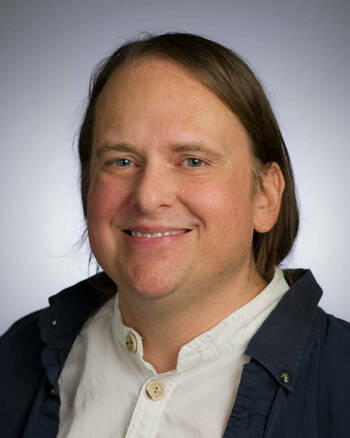In memoriam: Benjamin Radcliff, professor of political science

Benjamin Radcliff, a professor in the Department of Political Science at the University of Notre Dame, died June 10 after a long illness. He was 60.
Radcliff’s scholarly work focused on the intersection of American and comparative politics. He made significant research contributions in three primary areas: social choice theory, the political influence of organized labor and the politics of human happiness.
“He was a prolific scholar, pioneering the study of how political systems influence what he would call the ultimate dependent variable: human happiness,” said Matthew E.K. Hall, the David A. Potenziani Memorial College Professor of Constitutional Studies and director of the Rooney Center for the Study of American Democracy. “He liked to project a cantankerous, sarcastic persona, but it did little to persuade me that he was anything less than a saint.”
From Ottawa, Illinois, Radcliff received his doctorate in political science at the University of Illinois Urbana-Champaign. He held faculty positions at Rutgers University and Vanderbilt University for two years each, and was part of Notre Dame’s political science department for 30 years. During his tenure, Radcliff served as the director of graduate studies for six years and as the director of the Rooney Center from 2012 through 2013.
His book “The Political Economy of Human Happiness: How Voters’ Choices Determine the Quality of Life” detailed his research on the connection between government support for citizens and workers and overall human happiness. Radcliff also completed two edited volumes and 45 referred journal articles, 14 of which appeared in the three leading journals in political science: the American Political Science Review, the American Journal of Political Science and the Journal of Politics.
From 2019 through 2022, with department chair and professor Geoffrey Layman, Radcliff served as the co-editor-in-chief of Political Behavior — the official journal of the elections, public opinion and voting behavior organized section of the American Political Science Association. In this position, Layman said, Radcliff was known for his thorough feedback, and he often kindly explained his reasonings to authors whose manuscripts he rejected.
“Ben not only helped the journal reach new heights in terms of scholarly impact and ranking, but also was an exceedingly caring and thoughtful editor,” Layman said.
Beyond academia, Radcliff was also known for his ability to engage in enlightening conversations on subjects ranging from history and politics to music, literature, wine and arcane trivia. With his wife, Amy, Radcliff published the book “Understanding Zen,” which examined zen as a secular doctrine without any necessary relationship to Buddhism or Eastern culture. He also wrote an article on “The Beer Renaissance” in Sky, the Delta Airlines magazine.
“In short, Ben did not just study human happiness, he actively contributed to it,” Layman said.
Radcliff is survived by his wife, as well as his mother, brother and many nieces and nephews. A celebration of life is scheduled to be held in August. Those who wish to honor his memory with a donation can do so at Heifer International using the link set up by his colleagues.
Originally published by at al.nd.edu on July 3.
Latest Faculty & Staff
- In memoriam: Alasdair MacIntyre, the Rev. John A. O’Brien senior research professor of philosophy emeritusAlasdair MacIntyre, the Rev. John A. O’Brien senior research professor of philosophy emeritus and a permanent senior distinguished research fellow at the de Nicola Center for Ethics and Culture, died on May 21, 2025. He was 96.
- Santiago Schnell, dean of Notre Dame’s College of Science, appointed as provost of DartmouthSantiago Schnell, the William K. Warren Foundation Dean of the College of Science at the University of Notre Dame, has accepted an appointment as provost at Dartmouth College. He will depart Notre Dame at the end of June and begin his new role in July.
- Notre Dame’s Fightin’ Irish Battalion receives Department of Defense award as nation’s top Army ROTC programThe United States Department of Defense honored the University of Notre Dame’s Army ROTC Fightin’ Irish Battalion as the nation’s top Army collegiate program for the 2023-24 academic year. This will be the first time the unit has received the department’s Educational Institution Partnership Excellence Award, which recognizes the program’s achievements in recruiting, educating, training and commissioning leaders of character to be the next generation of military officers.
- In memoriam: Karl Ameriks, the McMahon-Hank Professor of Philosophy EmeritusKarl Ameriks, the McMahon-Hank Professor of Philosophy Emeritus at the University of Notre Dame, died on April 28 from pancreatic cancer. He was 77. Born in post-World War II Germany, Ameriks’ family emigrated to the United States when he was a child, and he grew up in Detroit, Michigan. He received his bachelor’s and doctoral degrees from Yale University. He came to the Department of Philosophy at Notre Dame in 1973 during a formative time for the department, which had transitioned from a predominantly Thomist focus to the more analytical American philosophy in the 1960s.
- Notre Dame psychologist explores how children best learn math — and yes, timed practice helpsUniversity of Notre Dame professor of psychology Nicole McNeil recently co-authored a report that examines the best way for children to learn arithmetic — whether that’s by memorizing number values and multiplication tables, or by studying math at a deeper, conceptual level. The report, “What the Science of Learning Teaches Us About Arithmetic Fluency,” was published in the journal Psychological Science in the Public Interest and shows that children learn most effectively when instruction follows an evidence‑based cycle: grounding facts in conceptual understanding, using brief timed practice to make those facts automatic, and then returning to discussion and reflection to deepen that knowledge.
- ’Tis the season for ticks and mosquitoes. A medical entomologist talks about these pests and how to avoid them.Notre Dame expert Lee Haines explains the risks mosquitoes and ticks pose to the Midwest and discusses how the public can best protect themselves and family members (including pets) from these bloodthirsty pests.












